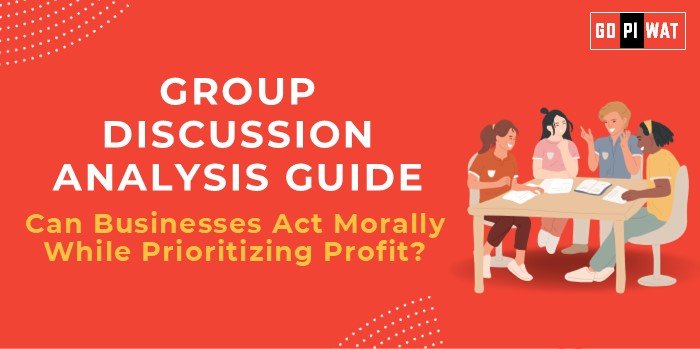📋 Group Discussion (GD) Analysis Guide: Can Businesses Act Morally While Prioritizing Profit?
🌐 Introduction
Opening Context: Businesses play a crucial role in shaping economies, societies, and environments globally. Balancing moral responsibility with profit-seeking has become a focal debate as stakeholders demand ethical practices alongside financial returns.
Topic Background: The tension between profit and ethics stems from the rise of capitalism in the Industrial Revolution and continues today, exacerbated by globalization, environmental concerns, and corporate scandals. Recent shifts, such as ESG (Environmental, Social, and Governance) investment trends, highlight evolving expectations.
📊 Quick Facts and Key Statistics
- 💰 Global ESG Investments: $35 trillion in 2023—signifying rising demand for ethical business practices.
- 📈 Corporate Responsibility Impact: 64% of global consumers are influenced by a company’s social values when purchasing.
- 🌍 Carbon Commitments: Over 20% of Fortune 500 companies aim for net-zero emissions by 2050, showing a move toward sustainable operations.
🤝 Stakeholders and Their Roles
- 🏢 Businesses: Responsible for aligning operational efficiency with ethical considerations like fair wages and sustainability.
- 🏛️ Governments: Regulate through policies like carbon taxes or labor laws to enforce moral conduct.
- 🛍️ Consumers: Influence companies through demand for ethical products and services.
- 📈 Investors: Drive ethical behavior by prioritizing ESG-compliant portfolios.
- 🌐 NGOs/Activists: Hold businesses accountable and push for systemic reforms.
🏆 Achievements and Challenges
✨ Achievements
- ✅ Ethical Branding: Companies like Patagonia lead in transparency and sustainability.
- 📜 Regulatory Compliance: EU’s Corporate Sustainability Reporting Directive ensures accountability.
- 🌍 Triple Bottom Line: Businesses integrating people, planet, and profit gain competitive advantage.
⚠️ Challenges
- 📉 Short-Termism: Quarterly profit pressures often outweigh long-term ethical goals.
- 🟢 Greenwashing: Misleading sustainability claims tarnish credibility.
- 🌏 Global Disparities: Ethical expectations differ across countries due to uneven regulatory frameworks.
🌍 Global Comparisons
Success: Scandinavian countries excel with ethical capitalism models, such as IKEA’s circular economy practices.
Challenges: Developing nations face ethical compromises due to weaker enforcement of labor and environmental standards.
📚 Case Study
Unilever’s Sustainable Living Plan: Increased sales by 69% for its sustainable brands over a decade while reducing environmental impact.
📄 Structured Arguments for Discussion
- ✅ Supporting Stance: “Ethical practices enhance long-term profitability by building consumer trust and brand loyalty.”
- ❌ Opposing Stance: “Prioritizing ethics compromises short-term profits, especially in industries with low margins.”
- ⚖️ Balanced Perspective: “While profits and ethics may conflict, businesses that strategize for sustainability often achieve both over time.”
🎯 Effective Discussion Approaches
- Opening Approaches:
- 📊 Data-Driven: “With $35 trillion in ESG investments globally, the market clearly values ethical businesses.”
- 📜 Historical Reference: “From scandals like Enron to modern greenwashing, ethical challenges in business persist.”
- 📚 Case Example: “Patagonia’s environmental focus shows profit and ethics can coexist.”
- Counter-Argument Handling:
- 🤝 Acknowledging Dilemmas: “Short-term sacrifices for ethics can yield long-term competitive advantages.”
- 🛠️ Providing Solutions: “Transparent reporting mitigates concerns about authenticity and greenwashing.”
📊 Strategic Analysis: SWOT
- 💪 Strengths: Long-term consumer trust, investor confidence, enhanced innovation.
- 📉 Weaknesses: Higher operational costs, slower returns.
- 🚀 Opportunities: Growing ESG markets, regulatory incentives.
- ⚡ Threats: Reputational risks from missteps, uneven global standards.
📈 Connecting with B-School Applications
- 🌐 Real-World Applications: Exploring CSR models in operations management or finance.
- 🗣️ Sample Interview Questions:
- 💬 “How do ethical considerations impact profitability in global markets?”
- ⚖️ “Can regulations drive companies to balance profit with morality?”
- 🎓 Insights for B-School Students:
- Ethical business practices align with leadership principles.
- Opportunities to design frameworks balancing ethics with profitability in projects.


